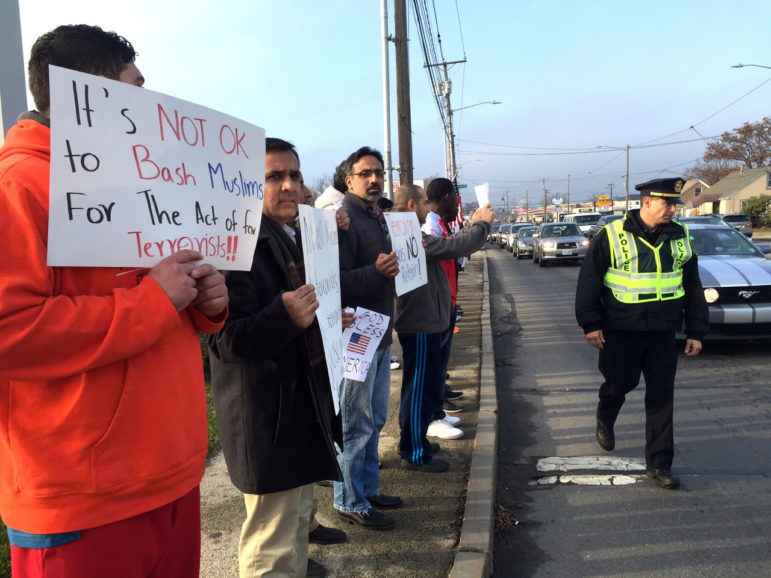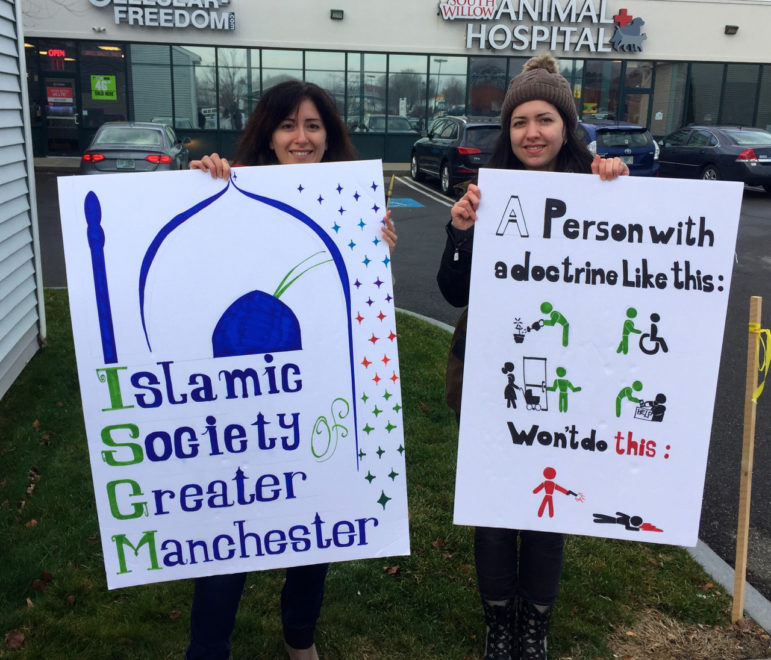“We’re caught up in a storm beyond our control. We are American citizens, first and foremost.” – Dr. Salman Malik

MANCHESTER, NH – It was not a premeditated vigil.
Two days before the spontaneous peace walk on Dec. 11, members of the Islamic Society of Greater Manchester came together to pray at their South Willow Street mosque, as always.
But conversation gravitated, from pleasantries to the growing sense of uneasiness within their community.
Zafar Khan says he was watching the news Dec. 2 with his sons – Hassan, 10, and Hamdan, 11, – when news of the deadly mass shooting in San Bernardino was broadcast.

“My kids were praying that the names of the shooters would not be Muslim names, or at least not Arabic. We knew if they were, there would be backlash against Muslims,” says Khan. “I want to raise my children in an environment without fear.”
Khan and his wife moved to the United States 20 years ago from Pakistan, for a chance at their American dream. He earned a master’s degree in engineering here, and they became grateful parents in a place that promised a kind of freedom they had never known before.
That’s why on Dec. 11 the brothers joined their dad to walk along South Willow Street. Hassan carried a large poster almost obscuring his small frame, the word “ISIS” written in black inside a circle with a thick, red X through it. Hamdan walked next to his brother with two smaller signs, both with a single message, “PEACE,” one bearing a flag-shaped U.S. map and the other depicting an American flag.
They were among 100 or more participants in the inter-faith march, people looking for a way to start the conversation in New Hampshire nobody seems willing to have, about what it means to be Muslim, and what it doesn’t; about the fears – spoken or not – that we all harbor as inhabitants of this uncertain world.
“I try to look at it from both sides. I don’t hold non-Muslims responsible for any of this. The looks or the stares they may give is not necessarily because they hate us; it’s because they don’t know, and they want to know,” says Dr. Salman Malik, a Londonderry oral surgeon and longtime member of New Hampshire’s Muslim community.
He says the heightened fear directed toward Muslims following the California mass shooting is understandable, even justifiable. The actions of extremists and misdirected hatred, unconscionable.
“I think everyone knows that there’s no real religion out there that says “kill, kill, kill – for the sake of killing.’ Most of those who go through with these killings aren’t really involved in any religion, I believe. They’re just caught up in their own rigid ideology, whatever that might be,” says Malik.
New Hampshire Muslims need to put the “response” in responsibility by initiating the conversation and communicating better with the community at large, says Malik.
For the Balleh sisters of Manchester, the heightened fear and residual post-San Bernardino hatred directed toward Muslim women was reason enough to stand up and speak up.

Rouba Balleh, 32, and Bana Balleh, 22, of Manchester, say they decided to make signs and participate in the vigil to demonstrate that violence is not a part of the Muslim faith they follow.
“We wanted to show our compassion to the families of the victims in the San Bernardino shootings,” says Bana Balleh. “And we are here as a way of promising that we will keep the peace in our community.”
Because one of the California shooters was identified as a radicalized Muslim woman, Tashfeen Malik, the Balleh sisters say it’s even more important for Muslim women to condemn the violence, which they say does not represent their faith.
“For her, especially as a mother, she should have mercy on everyone,” says Bana Balleh.
“Every time we hear about something like this we are praying that it does not involve a Muslim because it effects us in a negative way, just walking around or going to the airport and traveling. It makes everything more difficult,” says Rouba Balleh.

“And we understand the looks and suspicion, and the fear. That’s a normal, human reaction. But it’s not the easiest thing for us to go through. We can’t blame anyone – they have the right to be afraid, because it’s our natural instinct, but at the same time we should slowly be able to learn that there is a difference between beliefs and actions,” Bana Balleh says.
Nabil Migalli has lived in New Hampshire for decades. He was born in Egypt and is a Coptic Orthodox, the oldest Christian religion in Egypt, founded by the apostle Mark who traveled there to evangelize the message of Jesus Christ. But having been born and raised in a country that is 90 percent Muslim, Migalli knows well what being Muslim is all about.
“It is not realistic – and it’s incorrect – to judge a religion by some followers. Islam is a religion. Muslims are a people. Islam is not liable for Muslims. Same thing with The Crusades – is Jesus liable for The Crusades? That’s why it’s important to separate the religion from the people. In every group there are people who are good and people who are bad,” says Migalli.
And it’s just as wrong to bring religion into politics, as Donald Trump has been doing, says Migalli.

“It’s un-American, it’s not Christian, and it’s stupid. What will happen to the ambassadors, the medical community from other countries, the athletes, the official international visitors? If he is to be the top representative of the United States, we’re going to hell as a country,” Migalli says.
Sarah Jane Knoy, Executive Director of the faith-based social advocacy group known as the Granite State Organizing Project, says she joined the demonstration to reinforce the truth she carries with her every day, that faith doesn’t drive people to hate.
“To say one faith should be outlawed in this country is completely against the Constitution as well as against the values that GSOP holds dear,” Knoy says. “I think people have a hunger to connect and they just don’t know how to do it, so it’s important that we all work together to find more ways to have events like this.”
So, then, how to bridge the growing gaps between us, that expose the torrent of religious intolerance raging below the surface in a country founded on having “no law respecting an establishment of religion, or prohibiting the free exercise thereof”?
That’s the $64,000 question, says Malik. He’s hopeful that the next generation will reject the well-worn fears and biases their parents and grandparents leave behind.
Interfaith meetings are a positive practice, but not everyone belongs to a faith-based community, he says. Getting involved with organizations that feed the soul of a community can help – Malik is a member of Rotary Club of Londonderry, for example, which allows him to connect with like-minded people interested in doing the work that elevates the human race.
It’s simple stuff.
“Help at a soup kitchen and just feed your neighbor,” Malik says. “That was the message of today’s kutbah, the sermon we heard today. I told the person who gave it that it was the best one I’ve heard yet, because it was so simple: Be patient and be good neighbors. It wasn’t full of all this esoteric detail about the theology behind the religion and how it should be practiced. It was about basic manners, and how to respect each other,” Malik says.
“We need to find a commonality. Many people are just uncomfortable talking about religion. There’s only one person in this world who’s a Muslim like me, and that’s me. Everyone else is different, so when we start talking about what Islam is according to me, or what Islam is according to someone else, we’re going to have different interpretations,” Malik says. “We get caught up in the insignificant things about life rather than the big picture. We confuse the personal practice of faith with the simple act of ‘live and let live,’ and loving your neighbor as yourself.”

You’re one click away! Sign up for our free eNewsletter and never miss another thing







